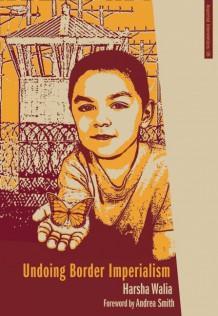
by Sasha / Earth First! Newswire
Undoing Border Imperialism (AK Press 2013) by Harsha Walia is both an intellectual achievement and a guidebook on how to build and contribute to a movement in days of increasingly intense struggle. People from all movements and walks of life will find something to take away from this book, which presents a commanding knowledge of its topic and an incredibly circumspect view of the intersections of other subjects.
Border imperialism, for Walia, is the manufacture of nation-states through arbitrary borders in order to repress local populations and enable the free flow of corporate capital. Race and class are both defining characteristics of border imperialism, contributing to the process of accumulation of capital by a small elite, and the dispossession of huge numbers of working poor. To “undo” border imperialism, then, is to untangle the lines, both physical and conscious, that inhibit free movement and association.
It starts out in the Sonoran desert bioregion—a place that I have called home. Discussing the nonviolent action of Tohono O’odham and allies, Undoing Border Imperialism will strike a chord with people in the US who have either lived in or read about the conflict zone known as the US-Mexico border. While the majority of Undoing Border Imperialism focuses on Walia’s decade of experiences as an organizer in Canada, it is deeply humbling to note that actions I was present during and involved in resonated across Turtle Island. As some of our readers will recall, when we weren’t tappy-tap-tapping on our keyboards, sitting in front of monitors for 14-hour, 100 degree days in the Tucson heat, Earth First! Journal editors were embroiled in the struggle. Our collective members were pepper sprayed with the O’odham, Dine, and anarchists in Phoenix, we faced down the Nazis and police in the streets, went out to the desert with No More Deaths, and took part in countless demonstrations.
What is special about Walia’s book, recalling the old “Earth First! is social war” adage, is its reflection on the amount of care and sensitivity that so clearly goes into building movements with staying power. The book is clearly a labor of love; the attention to detail present within its carefully wrought pages indicates a similar organizing style. The style, itself, reminds us that it is all too easy to choose one or the other—direct action or “the long march through the institutions.” Both require vigilant attention to shifting conditions, manifesting vital tactics towards successful movement building strategy. “Movement building,” Walia explains, “requires reflexivity.”
Undoing Border Imperialism makes numerous revelations that help map out a terrain of organizing. First, she clearly states her main goals and the goals of No One Is Illegal: “the freedom to stay and resist systematic displacement, the freedom to move in order to flourish with dignity and equality, and the freedom to return to dispossessed lands and homes.” Walia notes that migration today is uniquely defined by the problematic presence of the nation-state. While migration is a symptom of settler colonialism, however, migrants are not colonists.
In one of the most powerful passages, Wallia contemplates her work with First Nations in Canada. First Nations are very hard hit by nationalist policies in Canada, she notes, but they are far more welcoming and respectful towards international migrants who are often maligned and marginalized. The actions of these First Nations, as well as No One Is Illegal and other groups mentioned in Undoing Border Imperilism, is a testament to the heart and the courage of unconquered peoples. Their solidarity comes in action, not in words. To reinforce this tremendous common current, Walia draws on a fertile ecosystem of ideas and thoughts, from postcolonial theorists to human rights reports. There is always a subtle indication of people’s depth; that, after illusions are swept away, their personally sustained and protected opinions are only a blink of an eye away from liberation.
Walia quotes NOII-Vancouver (Indigenous Coast Salish territories): “We envision and actively strive for a humanity where everyone has the right to sustenance and the ability to provide it, where we are free of oppression, misery, and exploitation, and are able to live meaningfully in relationship to one another and in reverence for Mother Earth that sustains us.” Here is the decolonizing moment of bioregionalism, where the defense of integrity of living, Indigenous systems amidst mounting migration needs (including climate refugees) requires inclusivity and understanding against the kind of xenophobic wall-building that characterizes settler colonialism.
It is, indeed, a radical imagination that directs the book, and a penetrating analysis that moves through the actual facts and realities of grounded organizing. Walia works to support both Indigenous and migrant populations together by promoting mutual understandings. A constant attack on elitism, Undoing Border Imperialism opens the door to all social groups to share their experiences and pull together in times of collective need. Through such decolonizing praxis comes transformative relationships to one another and to the land. Walia’s book does a terrific job of galvanizing such interactions.
Check out Sasha’s latest book, Grabbing Back: Essays Against the Global Land Grab, just out through AK Press.

